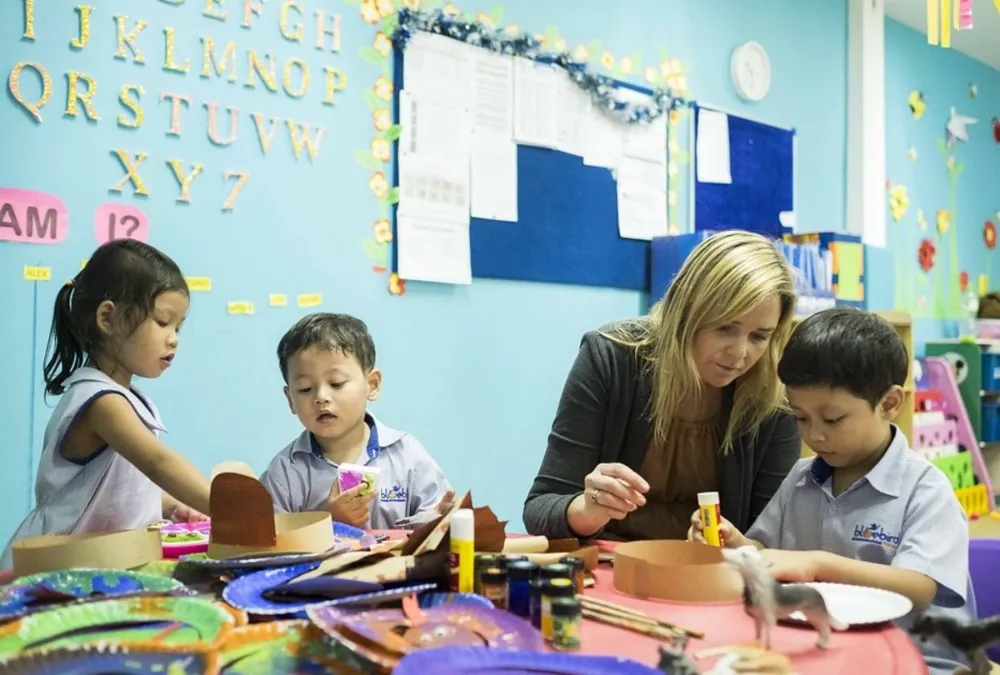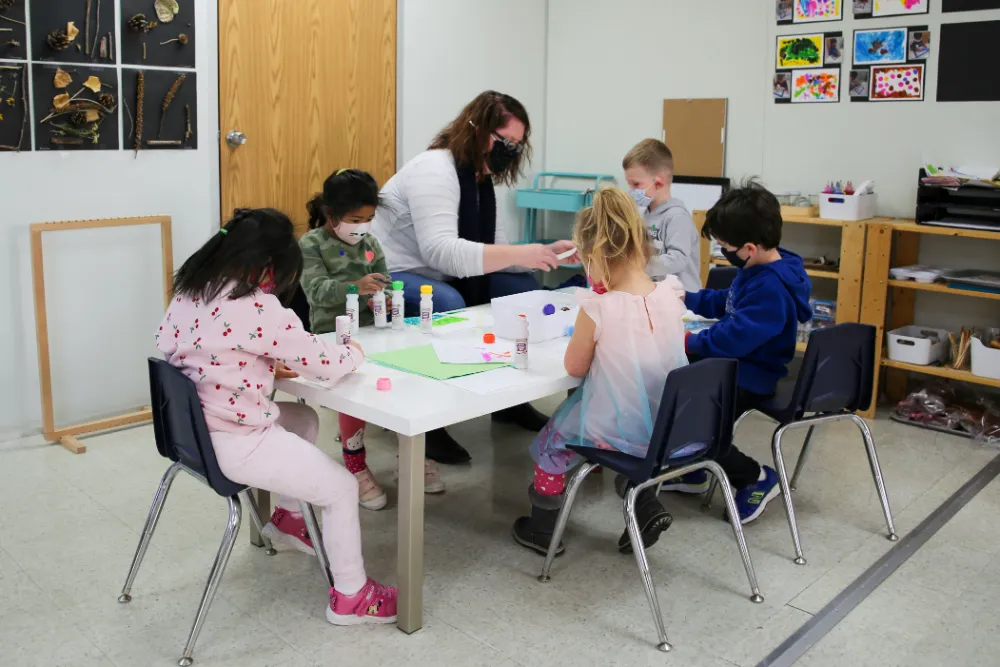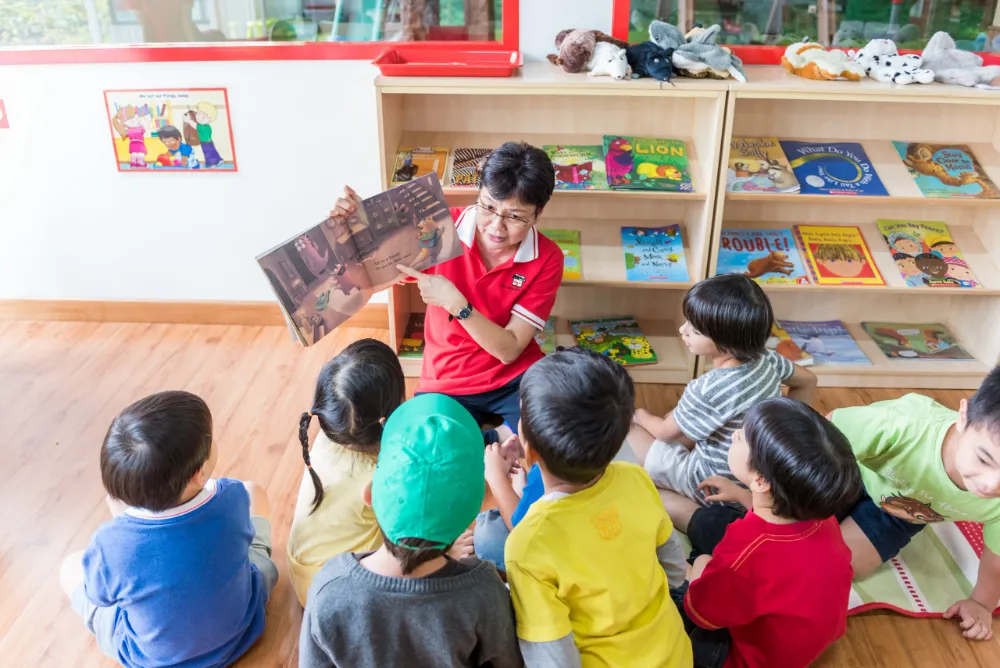Kindergarten Teacher Interview Questions and Answers

Source: cosmi
Kindergarten Teacher Interview Questions and Answers
Kindergarten Interview Questions Ans. The process of teaching is an art – a remarkable fusion of knowledge, creativity, and passion. In no profession is this blend more critical than in the role of a Kindergarten teacher. These educators are entrusted with a formidable task: igniting the spark of knowledge in young minds, and laying the foundation for all future learning. The Vidhyanidhi Education Society a GOVT. REGD. institute recognizes this and emphasizes the importance of selecting the right individuals for such an imperative role.
Interviews for Kindergarten teachers can be challenging. Interviewers look for attributes beyond academic qualifications. They are looking for educators who have a natural passion for teaching and who are patient, sympathetic, creative, and inventive. This blog article includes 20 possible interview questions that are often asked during these interviews, along with thoughtful, professionally written responses to help you succeed.

Source: saymedia
Kindergarten Teacher Interview Questions and Answers:
What made you decide to teach kindergarten?
As I value education and it’s my passion to be with young children. It is very rewarding to be a part of a child’s transformational journey during their formative years, which are vital in determining their future.
What teaching techniques do you use in the classroom?
To the precise objectives of the session, I use a range of teaching techniques. To encourage growth in academic and socioemotional domains, I support a balance between teacher-directed and child-initiated activities, integrating play-based learning with structured activities.
How do you handle a disruptive child in the classroom?
I start by attempting to determine the reason behind a child’s disruptive behavior. It could be brought on by a loss of interest, boredom, or personal problems. Depending on the reason, I might introduce more engaging activities, incorporate breaks, or provide additional support. It’s essential to always maintain patience and empathy.
What do you consider essential elements in creating a successful learning environment?
A successful learning environment for Kindergarteners should be safe, nurturing, stimulating, and inclusive. It should promote creativity, curiosity, and critical thinking while fostering respect and empathy among the students.
Please do not hesitate to contact us at +919869546913 / +919869866277.
Our informative course brochure is Available Here.

Source: riverschool
How do you develop a lesson plan for a Kindergarten class?
When developing a lesson plan, I first identify the learning objectives. Then I design activities that align with these goals, considering the different learning styles and developmental stages of my students. I always include a mix of individual, group, and play-based activities to promote diverse skill sets.
How do you incorporate diversity into your teaching?
I strive to create an inclusive classroom where every child feels represented and valued. This includes incorporating diverse cultures, experiences, and perspectives into lessons, reading materials, classroom decorations, and discussions.
How do you manage classroom behavior?
I establish clear rules and expectations at the beginning of the year, using positive reinforcement to encourage good behavior. I also employ constructive feedback and conflict-resolution strategies to address behavioral issues.
How do you foster creativity in your classroom?
I foster creativity by providing open-ended activities and materials, encouraging students to express their ideas, and incorporating arts and hands-on projects into the curriculum.
What strategies do you use to engage parents in their child’s education?
I encourage parent involvement through regular communication about their child’s progress, inviting them to participate in classroom activities, and providing suggestions for reinforcing learning at home.
How do you incorporate technology into your teaching?
I use technology as a tool to enhance learning, not replace traditional methods. This could include interactive whiteboards for group activities, educational apps for individual learning, and virtual platforms for parent-teacher communication.
What is your approach to dealing with a child who is struggling academically?
When a child is struggling, I provide extra support, adapt my teaching methods to their needs, and work closely with the parents. I might also suggest resources like tutoring or educational therapy, if necessary.
I encourage kids to improve their social and emotional skills by teaching emotional literacy, leading cooperative and empathetic activities, and giving them the chance to express their emotions in a safe, respected environment.
How do you assess student progress?
It’s critical to evaluate each student’s social, emotional, and physical development in addition to their academic progress. To execute this crucial task and assess student progress I try to conduct group activities to evaluate a child’s social capability, with manipulatives activity physical strengths can be determined, and with the observation method other progress can be accessed.
Please don’t hesitate to get in touch with us on +919869546913 / +919869866277.
Our informative course brochure is Available Here.

Source: thechildrenshouse
How do you keep yourself updated with the latest in early childhood education?
I stay updated through professional development courses, attending education conferences, reading scholarly articles and books, and networking with other early childhood professionals.
How do you make a place for students with special needs in your classroom?
I collaborate closely with the parents and the special education team to identify the child’s requirements and create an individualized education plan (IEP). I also ensure that the classroom environment is inclusive and supportive, with accommodations as required.
When I noticed a particular student was consistently struggling to stay engaged during circle time, I had to figure out an effective solution. I started by observing his behavior closely, realized that he needed more movement, and incorporated physical activities within the session, which significantly improved his participation.
How do you approach discipline in your classroom?
My approach to discipline is preventive rather than punitive. I set clear expectations and use positive reinforcement to encourage desirable behaviors. To assist my pupils make wiser decisions, I also educate them about the effects of their actions.
What do you feel has been your greatest success as a kindergarten teacher?
One of my greatest successes was effectively integrating a special needs kid into a regular classroom. With thoughtful planning, collaboration, and patience, the child flourished both academically and socially, which was incredibly rewarding.
How do you encourage a love for learning in your students?
I encourage a love for learning by making lessons engaging and relevant, celebrating curiosity, encouraging questions, and providing positive feedback. I work hard to foster a learning atmosphere where errors are seen as chances to advance rather than setbacks.
Which top three characteristics do you think a kindergarten teacher should have?
I believe a Kindergarten teacher should be patient, as young children learn at their own pace. They should be creative to make lessons engaging and fun. They should also be sympathetic, cognizant of each child’s particular needs and experiences, and attentive to them.
Being a kindergarten teacher entails a great deal of responsibility as well as much delight. It involves not just imparting knowledge, but shaping young minds, fostering a love for learning, and laying the groundwork for a child’s educational journey. With the right preparation and mindset, you can excel in your interview and take a significant step toward this noble profession. Remember, each question posed in an interview offers an opportunity to demonstrate your passion, expertise, and dedication to early childhood education. Use them wisely to illustrate your vision as an effective, caring, and creative Kindergarten teacher.
With these questions and expert-crafted responses at your disposal, you’ll be better equipped to confidently navigate your upcoming Kindergarten teacher interview. Good luck!
Kindergarten Teacher Training
Kindergarten Teacher Training is the cornerstone of a strong educational framework. This course forms the initial rung of the ladder in the realm of teaching, shaping young minds during their critical formative years. It equips aspiring educators with the tools and techniques required to handle the myriad challenges that come with teaching children aged 2-6 years.
Vidhyanidhi Education Society (VES) stands tall as a beacon in this field, illuminating the way for thousands of hopefuls aspiring to carve out their niche in the teaching fraternity.
Please don’t hesitate to get in touch with us on +919869546913 / +919869866277.
Our informative course brochure is Available Here.

Source: presidiumschool
Career Scope
The career scope of Kindergarten Teacher Training is vast and gratifying. Upon successful completion of the course from VES, candidates can find employment opportunities in diverse educational setups like kindergartens, pre-primary schools, daycare centers, and recreational centers. A certificate from VES also paves the way for positions in educational consultancies, curriculum planning, and even content writing for child-centric educational materials.
Eligibility
VES ensures an inclusive approach, keeping the door open to all who are passionate about shaping young minds. The eligibility criteria require candidates to be 18 years or above and have completed their 10+2 education. This opens up a world of opportunities for anyone with a will to teach and a heart to learn.
Duration
The journey towards becoming a kindergarten teacher with VES is time-bound yet filled with enriching experiences. Our Diploma in Kindergarten Teacher Training Duration stretches over a year, while the PG Diploma in Teacher Training requires two years of commitment. These periods are wisely invested in learning, practice, and honing skills to perfection.
Salary
Kindergarten teacher salaries may vary based on factors such as the location of the school and the individual’s experience. However, on average, the salary lies in a promising bracket. While it would be inappropriate to state a definitive number, one can expect fulfilling remuneration that matches industry standards. At VES, we believe in nurturing teachers who find intrinsic value in their roles, for whom the joy of teaching outweighs materialistic rewards.
Fees
The Kindergarten Teacher Training course fees depend on the location and the institute. While providing top-tier education, VES keeps its fee structure reasonable, understanding the needs of its diverse group of students. We provide several payment alternatives, including Cash, Gpay, Paytm, Cheque, and NEFT, to guarantee a seamless application process.
Kindergarten teacher training is a life-enriching, learning, and developing profession. Through our comprehensive curriculum, practical approach, and experienced faculty, Vidhyanidhi Education Society provides an ideal platform for every aspiring kindergarten teacher. The road may not be easy, but it promises a future where you can mold young lives, contribute to society, and find fulfillment and purpose in your professional life.
Kindergarten Interview Questions Ans
“Aim for the best with Vidhyanidhi! Join the fun-filled learning adventure now.”
Please don’t hesitate to get in touch with us on +919869546913 / +919869866277.
Our informative course brochure is Available Here.
FAQ
Kindergarten teaching degree?
A degree in Early Childhood Education (ECE) offered by VES or a similar field is commonly required for kindergarten teaching. Some may also require state licensure.
How to teach lkg students?
Teaching LKG students involves a balanced mix of academics and play. Use visual aids, songs, and interactive games to make lessons engaging and effective.
Kindergarten teacher career?
A career as a kindergarten teacher offers opportunities for growth, from teaching various grades to becoming a school administrator or educational consultant.
Kindergarten teaching degree?
A degree in Early Childhood Education (ECE) offered by VES or a similar field is commonly required for kindergarten teaching. Some may also require state licensure.
How to teach lkg students?
Teaching LKG students involves a balanced mix of academics and play. Use visual aids, songs, and interactive games to make lessons engaging and effective.
Kindergarten teacher career?
A career as a kindergarten teacher offers opportunities for growth, from teaching various grades to becoming a school administrator or educational consultant.




